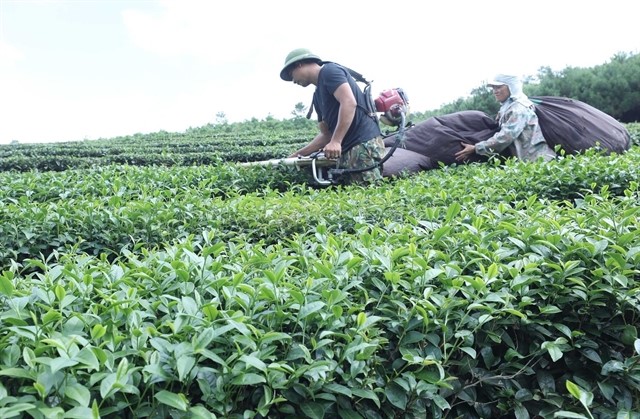A report by the Center for Digital Transformation and Agricultural Statistics showed that the organic tea cultivation areas remain modest in Việt Nam.

Cooperatives have been advised to focus on branding and improving product quality to expand tea exports to highly-demanding markets, especially organic tea products.
A report by the Center for Digital Transformation and Agricultural Statistics showed that the organic tea cultivation areas remain modest in Việt Nam, estimated at around 8,000ha or 6 per cent of the country’s total tea growing area.
In Thái Nguyên Province which is home to the country’s largest tea growing area of nearly 23,000ha, there are only 100ha certified organic.
Tea growing area certified organic by the EU is only at 2,500ha.
To expand exports to demanding markets with strict requirements of food hygiene and safety, getting organic certifications is critical.
Trần Thị Bình, director of Thành Đạt Organic Agricultural Cooperative in Thái Nguyên Province, said that they want support to improve product quality and expand exports.
Đào Thanh Vân, Deputy President of Việt Nam Organic Agriculture Association, said Việt Nam has around 100,000ha of tea growing area but the tea export price at US$1.6 per kg is very low.
Phạm Văn Tiến from Cao Sơn Tea Cooperative said that the market remains the biggest difficulty to cooperatives producing organic teas. Another problem is the weak linkage between farmers and enterprises in establishing tea value chains, he said.
Meanwhile, climate change is significantly affecting tea cultivation.
Currently, Việt Nam ranks fifth in the world in terms of tea export but it is mainly exported in raw forms with a lack of originality, making it difficult to compete in the global market so the added value for tea growers and cooperatives remains modest.
According to David Lyons, director at Australian Tea Cultural Society, the focus should be on building brands for Vietnamese tea products to expand exports to strict markets like Australia.
Impressive brands are important to develop loyalty customers, he said, adding that attention should also be paid to packaging.
Thân Dy Ngữ from Hiệp Thành Limited Company said that cooperatives and farmers should connect with each other to increase output and ensure quality for domestic production and exports.
Statistics showed that Việt Nam exported 28,000 tonnes of tea in the first three months of this year, worth $45 million, an increase of 30 per cent and 27.2 per cent, respectively, over the same period last year.
In 2023, tea export was estimated at 121,000 tonnes, worth $211 million, dropping by 16.9 per cent in volume and 10.9 per cent in value over 2022, on falling consumption demand in the global market. — VNS





